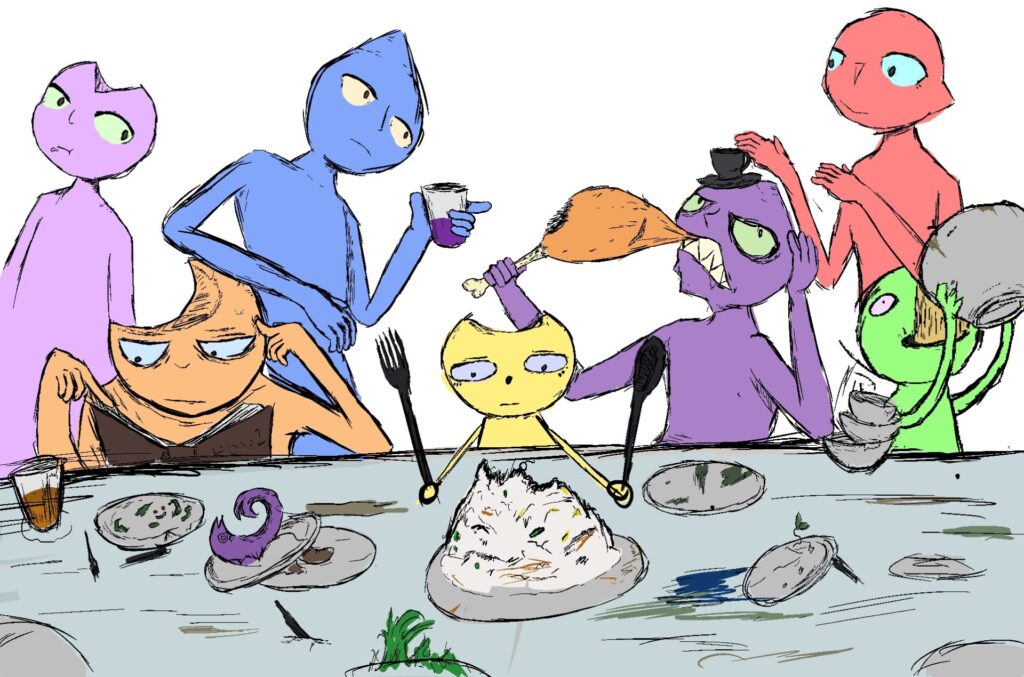Stress, beauty standards, social pressure exacerbate struggles regarding body image, disordered eating

When you left for college, did anyone tell you to “beware the freshman 15”? I was told that.
I joked about it with family and friends, I made sure to sign up for PE classes, I laughed about how a campus full of stairs and hills would be great for built-in cardio. As much as I am not proud of it, I was anxious about weight gains that I viewed as inevitable.
And I am not alone. The Child Mind Institute reports that college is a breeding ground for bulimia and anorexia nervosa, as well as a host of other disordered eating behaviors. Multiple factors influence this, worsening the desire for control that is associated with the root of most disordered eating patterns. It is not uncommon for a teen with healthy eating habits in high school to lose that in college.
According to eating disorder experts, triggering factors of disordered eating in college include the erosion of structure found at home, the search for control in an anxiety-producing environment and the exposure to a social life with strong emphasis on beauty standards (which overwhelmingly reward thinness) and romantic relationships. As a response, teens in college begin to restrict their eating, and it is easy to hide these behaviors among complaints about dining hall food, being too busy to eat or social binge eating.
There are even social rewards for eating disorders. It has been a longstanding undercurrent on social media that teens can romanticize not eating and body-checking (showing off how skinny one has become). Casually mentioning you forgot to eat is not always met with the concern appropriate for disordered eating patterns — it can be met with the positive reinforcement of “Oh, I ate so much today, I feel like a pig” or similar comments.
As for drinking culture, who has not heard the phrase “eating’s cheating?” If you are lucky enough to be around people who notice that not eating all day is cause for worry and not jealousy, it can be easily explained away as wanting an efficient way to get wasted by drinking on an empty stomach.
Finally, a special (somewhat ignominious) shoutout goes to college athletic programs for being an area of special concern for developing eating disorders, particularly in cisgender men. The focus on weight as a part of athletics is a dangerous place for eating disorders that manifest as incredibly restrictive dieting, intensive gym use and binge-purge cycles. While many athletics programs are aware of these dangers, it is a very real part of college athletics that is, according to some studies, currently on the rise.
Many behaviors that constitute disordered eating are easily hidden, even from the person practicing them. While often I shy away from self-diagnosis, I strongly encourage everyone to be brutally honest with themselves regarding how healthy and sustainable their diets are. Do you constantly feel tired, irritable or ill? Do you feel guilty about eating until you are full? Do you eat regularly and with an emphasis on balance instead of portion size or calories? It is nothing to be ashamed of — but it is something to be aware of.
Between the relative ease of concealing this behavior to the social rewards of being skinny and never eating, eating disorders on college campuses are a real problem. We are so concerned with how we are perceived and how we are doing in our own lives that we view perfectly normal processes and fluctuations as something to be controlled and mitigated.
According to the Centers for Disease Control and Prevention, a concentrated weight gain in one’s early twenties in both assigned male and female at birth bodies is healthy and normal. Our bodies are not finished growing and developing. But as puberty (because yes, for many of us this is not a done deal) finishes wrecking havoc at different times, we end up comparing ourselves not just to how we used to look but to how our peers do. Here, the trouble begins.
I certainly do not look the same as I did at 16, and that is what is supposed to happen. But combined with the stresses of leaving home and the expectations of success I have for myself, it can feel like a personal failure. It is not fair to me or to anyone else to try and conform to a certain standard. We have to remember how toxic the desire to stay skinny is, and how completely arbitrary body ideals are. It is trite to say, perhaps, but you are beautiful just the way you are. Eat three meals a day. It is going to be just fine.
Subscribe to the Mossy Log Newsletter
Stay up to date with the goings-on at Lewis & Clark! Get the top stories or your favorite section delivered to your inbox whenever we release a new issue.

Leave a Reply